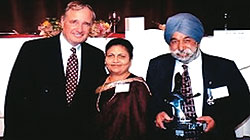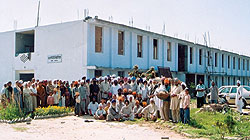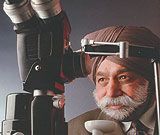|
For 71-year-old Anup Singh Jubbal, a Canadian of Indian origin, giving the poor and needy a “healthy vision” has been a life-long mission. Now finally, his vision has borne fruit and he and his team of surgeons, doctors, administrators and other support staff are giving the final touches to the multi-speciality Sri Guru Hargobind Sahib Mata Sulakhani Eye Hospital in Chabba village in Amritsar. This modern eye hospital and blindness prevention of centre is a venture of Jubbal’s non-profit Canadian Eyesight Global, and has been set up at a total cost of Rs 5.15 crore, with 75 per cent of the funds coming from the coffers of the Punjab government. The balance will be invested by Canadian Eyesight Global, a Canada registered non-profit society. A mobile eye screening van costing approximately Rs 9 lakh has been donated by Rotary Club of Surrey-Guildford, Canada.
Based in Vancouver, Jubbal, a Rotarian, is a recipient of the Queen’s Meritorious Service Medal in 1997. He has also been felicitated by Canadian Prime Minister Stephen Harper for providing vision to those who cannot otherwise afford it.
|

|
"I have a keen desire to convert this premier eye care centre into to a world class eye hospital. I seek support from those interested in joining hands to take quality eyecare to rural India" |
|
DECORATED: Jubbal was presented the Meritorious Service Medal by the Governor General of Canada |
Though born in Lucknow, Jubbal comes from Amritsar where his family still maintains their ancestral home. Jubbal, who is the brains behind Canadian Eyesight Global, says the state-of-the-art facility at Chabba will perform cataract surgery, hold eye clinics and host education and training programmes.
Jubbal, who was once chairman of the Rotary’s International Service Committee, has managed to get the support of the Rotary Clubs in Canada as well as India, besides a number of Sikh temples and the Indo-Canadian community for his project.
The Sri Guru Hargobind Sahib Mata Sulakhani Eye Hospital remains Jubbal’s pet project. He has moved immovable obstacles—including obstinate Indian bureacracy—to get the hospital off the ground. For instance, he persuaded Chabba’s Welfare Society to offer 62,000 sq ft of land, including a 24,000 sq ft building, to the organisation on a 99-year lease to the hospital. And he met Punjab Chief Minister Parkash Singh Badal accompanied by Gordon Campbell, premier of British Columbia.
To be sure, Jubbal travels to India every year to support and supervise free eye operation camps. As of now his organisation has performed more than 43,000 surgeries in India, besides treating thousands of others and prevented them from going blind.
“I have a keen desire to establish this premier eye care centre and convert it to a world class eye hospital,” says Jubbal. “I have spent most of my life helping the needy, the helpless and the less fortunate, helping restore their eyesight. In this I seek support from likeminded individuals interested in joining hands to take quality eyecare to rural parts of Punjab and other parts of India.”
To get his hospital off the ground, Jubbal persuaded Chabba’s village welfare board to offer his hospital 62,000 sq ft of land, and met the Punjab CM accompanied by the premier of British Columbia
|

|
| EYECARE: Built at a cost of over Rs 5 crore, this eye hospital in Chabba is Jubbal’s crowning glory. |
Jubbal’s Project Eyesight-India has been recognised by the government of Canada and Rotary International. Funding for various projects has been provided by Indo-Canadian Community in Greater Vancouver, Rotary Clubs in British Columbia, Rotary International and Canadian Rotary Committee for International Development Agency CRCID/CIDA. Since 2004, on a quarterly basis, it has organised free eye screening clinics in Greater Vancouver. As eye examination is no longer free under the medical services plan there, Canadians are now showing interest in getting their eyesight checked and even making donations to the hospital in order to help bring sight to countless individuals.
If Jubbal has selflessly served the needy, the world hasn’t been watching silently. In 1988, he got the first of a slew of recognitions when Rotary International presented the Distinguished Service Award. In the same year he was felicitated by John Fraser, Speaker, House of Commons Canada, at a gala dinner in Vancouver for his contribution to the Polioplus Campaign.
Since then he has received Rotary International’s highest Service Above Self Award; Meritorious Service Medal by the Governor General of Canada; Humanitarian Award Canada by the India-Canada Chamber of Commerce, Toronto; Outstanding Community Service Realtor Community Service Award presented by the Real Estate Board of Greater Vancouver; The Leader Community Mentor Award, sponsored by Canadian Tire; Paul Harris Fellow R.I. and many other prestigious awards.
However, success was not served on a platter, and Jubbal, who moved to Canada in 1968 after his senior secondary education, had to struggle hard in his initial years. He made his mark in the hard grind of real estate in Canada. He had to suffer losses in the business but that did not deter him from slogging again and getting back on his feet. He says ups and downs in life have taught him that money can provide everything except peace of mind.
At one stage, he had planned to start a private airline in India but delayed clearances and red-tape forced him to withdraw from the project. “My only mission is to serve people who have lost their eysight because of lack of resources,” he says, adding that his wife, Sarup Kaur Jubbal, has been a key motivating force in his life.
It may be mentioned here that cataracts are the result of a darkening of the eye's lens which can be caused by the rubella virus, trauma to the eye, and ageing. With surgery, impaired vision can be rectified by a lens implant.
Canadian Eyesight Global has had held several eye check-up camps in Gujarat, Uttar Pradesh, Madhya Pradesh, Maharashtra and Haryana with the support of rotary clubs of Canada and India. So far they have restored the eyesight or performed surgery on around 43,000 persons and treated thousands more for avoidable blindness. An eye camp was recently held in Gurdwara Parau at Fatehabad, near Goindwal Sahib, where surgeries were performed on people suffering from cataract and medicines distributed free of cost.
Speaking with pride on the multi-speciality eyecare and surgery hospital at Chabba, he says: “This hospital is crucial and we need the support of the community. Though eye surgery costs just Rs 1,750, it is beyond the reach of the poor, especially those living in villages.” According to him, blindness is 80 per cent preventable with good nutrition, sanitation, medicine or surgery.
Jubbal says people in Surrey can also arrange to host and fund eye clinics and surgeries in their home villages provided they raise the money to fund 100 surgeries, or a total of $3,500. “They can even go to India and participate in the eye clinics and get their relations to attend,” says Jubbal.
|
 INTERVIEW WITH ANUP SINGH JUBBAL INTERVIEW WITH ANUP SINGH JUBBAL
PRESIDENT AND CEO, CANADIAN EYESIGHT GLOBAL
"My organisation has performed more than 43,000 surgeries in India"
Establishing a cutting-edge eye hospital in Punjab has been a lifelong dream for Canadian-Indian Anup Singh Jubbal. He takes time out to talk to INDIA EMPIRE about how he is making a difference to people’s lives in India as well as Canada.
Please tell us about your childhood, where you grew up and where you studied?
I was born in 1935 in Lucknow, Uttar Pradesh. Ever since graduating from high school in 1952, I have dabbled in business. From 1954-1964, I was a saw mill owner and timber merchant in Raipur, Madhya Pradesh. Between 1964 and 1968 I lived in the Andamans and had business ventures there.
When did you immigrate to Canada?
I immigrated to Canada in 1968. The journey was a long and strenous one, which involved moving through several countries en route. In March 1968 I travelled by ship to Basra, Iraq, and then by rail and road through Iraq, Lebanon, Syria, Istanbul, Bulgaria, Yugoslavia, Greece, Italy and France. In the next leg I flew by Icelandic Airways to New York, and then took a bus to Toronto, from where I travelled by train to Kamloops, in British Columbia, Canada in September 1968. The whole trip took around six months. I lived in Kamloops from 1968 to 1986 and moved to Vancouver. Currently I live in Surrey, British Columbia.
In the years that you’ve spent in Canada what are the main areas that you’ve done your work and business?
I achieved success in Canada’s booming real estate market. Initially, I developed a 40-lot subdivision in 1973 and developed a number of properties in Kamloops. Venturing into the export-import business, I travelled around the world three times with business and trade delegations. I am a frequent visitor to the Middle Eastern countries. I’ve been a member of Rotary Club since 1986 and was the president for two terms in 1997 and 2001.
How many eye camps, and how many cataract surgeries have been carried out by Canadian Eyesight International?
My organisation has performed more than 43,000 surgeries in India, besides treating thousands of others and prevented them from losing their vision.
What motivated you to work in the area of blindness?
I have spent most of my life helping the needy, the helpless and the less fortunate, helping restore their eyesight. In this I seek support from like minded individuals interested in joining hands to take quality eyecare to rural parts of Punjab and other parts of India.
Which are the Indian states in which eye camps have been held by Canadian Eyesight?
Besides Punjab, Canadian Eyesight Global has held several eye check-up camps in Gujarat, Uttar Pradesh, Madhya Pradesh, Maharashtra and Haryana with the support of rotary clubs of Canada and India.
How expensive is treatment?
Eye surgery costs barely Rs 1,750, yet it is beyond the reach of the poor, especially those living in villages. We are mostly dealing with cataracts, which are the result of a darkening of the eye's lens and can be caused by the rubella virus, trauma to the eye, and ageing. With surgery, impaired vision can be rectified by a lens implant. We also stress on preventive care as blindness is 80 per cent preventable with good nutrition, sanitation, medicine or surgery.
Tell us about the recognitions and awards you’ve received as a result of your work?
In 1988, Rotary International presented the Distinguished Service Award. In the same year John Fraser, Speaker, House of Commons Canada, honoured me at a gala dinner in Vancouver. I have received Rotary International’s highest Service Above Self Award; the Meritorious Service Medal from the Governor General of Canada; the Humanitarian Award Canada by the India-Canada Chamber of Commerce, Toronto; Outstanding Community Service Realtor Community Service Award presented by the Real Estate Board of Greater Vancouver.
|
|